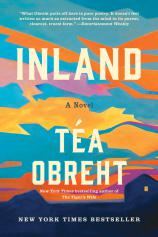Inland
Review
Inland
In the 1850s, the U.S. Congress approved the purchase of 75 camels to be used for both military purposes and as beasts of burden during the country’s expansion west. The camel program, while not without its successes, essentially ended about 10 years later with many of the camels being sold at auctions. A few of them became the stuff of legends: a white-haired camel named Said was a star in the camel corps before being killed by another dromedary in Los Angeles. And the myth of Red Ghost told of a giant and fearsome camel causing mayhem and worse in Arizona.
Téa Obreht, author of the award-winning THE TIGER’S WIFE, anchors her new novel, INLAND, on the reality of the camel corps, even referencing actual people and events. The book shifts between two stories --- that of Lurie, an outlaw who partners with a camel named Burke, and Nora, a wife and mother living in 1893 Arizona.
"...a masterful novel, drawing on the grand traditions of the western genre and expressing universal emotions. And yet, Obreht delivers a unique tale full of surprises, elegance and artistry."
Lurie, a Bosnian but generally mistaken for a Turk, was orphaned young and eventually found his keep with a band of outlaws, including his close friends Donovan and Hobb, who came to be called the Mattie Gang. When Lurie kills a man during a robbery, he draws the attention of a marshal named Berger, who searches for him for years to come. But it is the ghosts of Hobb and Donovan that really give chase to Lurie. He always must carry their desires and recollections with him. Nora, too, is haunted by ghosts, though she gives little credence to the idea of their existence.
Despite the presence of her niece, Josie, who is in near-constant communication with what she calls “the other living” and Nora’s own internal conversations with her deceased daughter, Evelyn, Nora refuses to believe in these specters and concentrates instead on life in the small struggling Arizona town of Amargo. In the course of a day, the life Nora has built begins to crumble around her. Her husband, Emmett, is missing; her adult sons are gone; her half-blind son, Toby, and Josie insist there is a monster about; and the political tensions of the town are about to erupt. Plus, there is no water, and Nora is very, very thirsty.
What at first seems like a desolate western landscape turns out to be populated by compelling and complicated characters, as well as uniquely beautiful flora and fauna and majestic vistas. INLAND may feel overwritten to some readers, yet it is undeniably a complicated story beautifully written, with prose that occasionally meanders but is always tremendously powerful. The dual perspectives of Lurie and Nora share the same ideas about memories and choices, and the same sense of loss, regret and sorrow, even in the face of great love. That they come together in the end is not surprising, but the details of just how is truly well done by Obreht. Danger takes on many forms here: thirst, regret, secrets, violence and heartbreak. And time, like water, is elusive, moving through a sieve of memory and space.
INLAND is a masterful novel, drawing on the grand traditions of the western genre and expressing universal emotions. And yet, Obreht delivers a unique tale full of surprises, elegance and artistry.
Reviewed by Sarah Rachel Egelman on August 16, 2019
Inland
- Publication Date: May 26, 2020
- Genres: Fiction, Historical Fiction, Western
- Paperback: 400 pages
- Publisher: Random House Trade Paperbacks
- ISBN-10: 0812982754
- ISBN-13: 9780812982756




